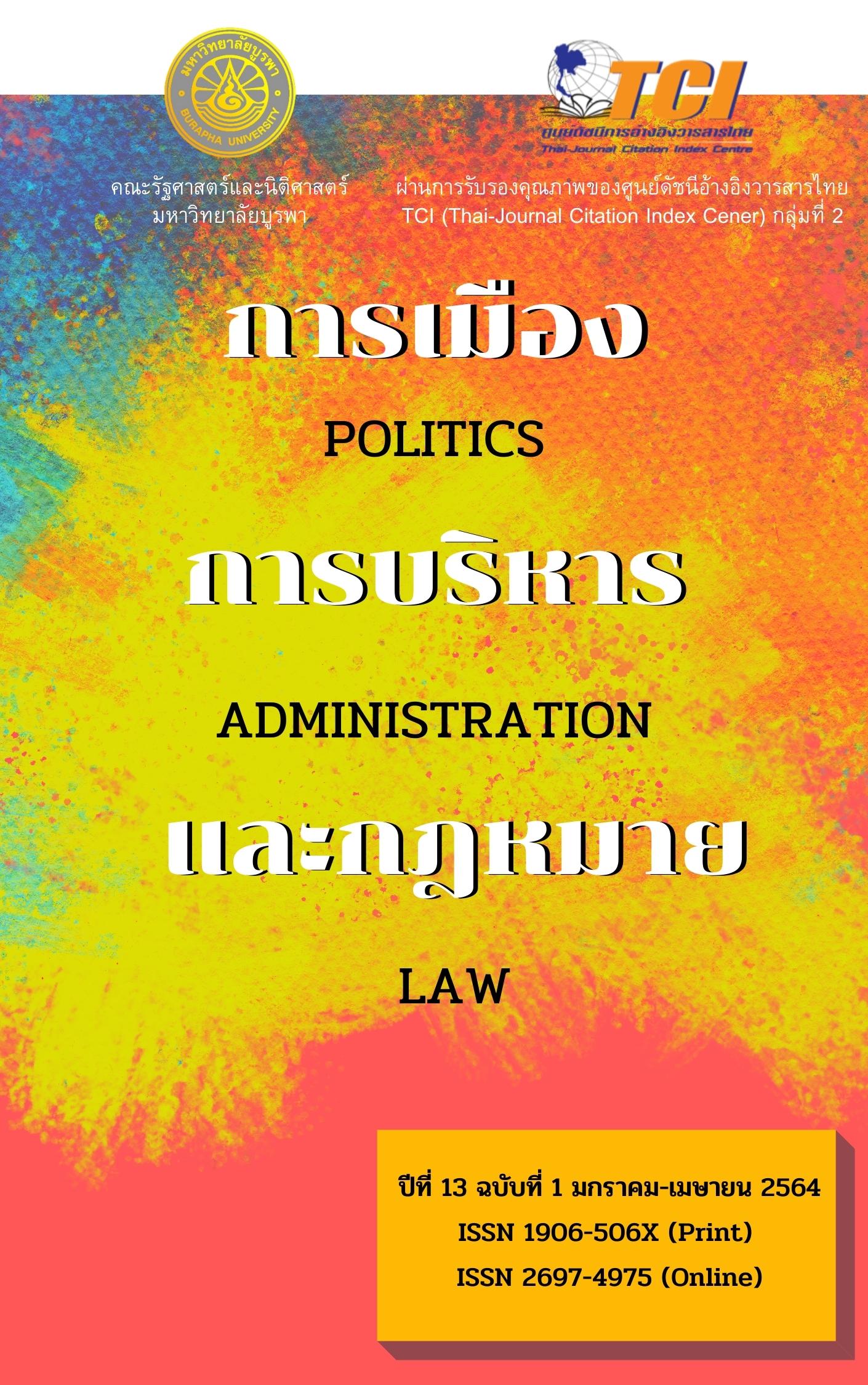ความรู้ของประชาชนต่อการซื้อผลิตภัณฑ์สุขภาพในภาคตะวันออกในประเทศไทย ปี พ.ศ. 2562
คำสำคัญ:
ความรู้ของประชาชน, ผลิตภัณฑ์สุขภาพ, ภาคตะวันออกในประเทศบทคัดย่อ
งานวิจัยนี้เป็นการวิจัยผสมระหว่างการวิจัยเชิงปริมาณและการวิจัยเชิงคุณภาพ มีวัตถุประสงค์ 1) เพื่อศึกษาความรู้ของประชาชนต่อการซื้อผลิตภัณฑ์สุขภาพในภาคตะวันออกในประเทศไทย ปี พ.ศ. 2562 2) เพื่อศึกษาการซื้อผลิตภัณฑ์สุขภาพในภาคตะวันออก ในประเทศไทย ปี พ.ศ. 2562 3) เพื่อศึกษาความรู้ของประชาชนที่มีอิทธิพลต่อการซื้อผลิตภัณฑ์สุขภาพในภาคตะวันออกในประเทศไทย ปี พ.ศ. 2562 และ 4) เพื่อศึกษาข้อเสนอแนะการซื้อผลิตภัณฑ์สุขภาพในภาคตะวันออกในประเทศไทย ปี พ.ศ. 2562 ประชากรที่ใช้ในการศึกษาครั้งนี้ เป็นประชาชนผู้บริโภคผลิตภัณฑ์สุขภาพในภาคตะวันออก กลุ่มตัวอย่างที่ใช้ในการศึกษาครั้งนี้คือประชาชนผู้บริโภคผลิตภัณฑ์สุขภาพในภาคตะวันออกจำนวน 400 คน ใช้แบบสอบถามเป็นเครื่องมือในการเก็บรวบรวมข้อมูล วิเคราะห์ข้อมูลด้วยความถี่ ร้อยละ ค่าเฉลี่ยเลขคณิต และการวิเคราะห์การถดถอยพหุและสหสัมพันธ์ ผลการศึกษาพบว่า กลุ่มตัวอย่างส่วนใหญ่เป็นหญิง มีอายุต่ำกว่า 25 ปี ส่วนใหญ่มีสถานภาพโสด มีอาชีพนักศึกษา จบการศึกษาระดับปริญญาตรี มีรายได้น้อยกว่า 10,000 บาทต่อเดือน โดยรวมความรู้ของประชาชนต่อการซื้อผลิตภัณฑ์สุขภาพอยู่ในระดับมากที่สุด โดยเรียงลำดับคะแนนจากมากไปหาน้อยได้ดังนี้ ด้านการนำไปปรับใช้ ด้านความรู้ ด้านการประเมินผล ด้านการวิเคราะห์ ด้านความเข้าใจหรือความคิดรวบยอด และด้านการสังเคราะห์โดยรวมกลุ่มตัวอย่างมีระดับการซื้อผลิตภัณฑ์สุขภาพในระดับมาก เรียงลำดับจากมากไปหาน้อย ได้แก่ การซื้อผลิตภัณฑ์สุขภาพด้านการเรียนรู้ ด้านทัศนคติ ด้านบุคลิกภาพและด้านวัฒนธรรม ด้านการรับรู้ ด้านชนชั้นทางสังคม ด้านกลุ่มอ้างอิง ด้านการจูงใจ และด้านบทบาททางสังคม ความรู้ของประชาชนที่ส่งผลต่อการซื้อผลิตภัณฑ์สุขภาพโดยรวม เรียงตามลำดับจากมีอิทธิพลมากไปหาน้อย ได้แก่ ความรู้ด้านการวิเคราะห์ ความรู้ด้านการสังเคราะห์ และความรู้ด้านการประเมินผล โดยความรู้ของประชาชนทั้ง 3 ด้านรวมกันสามารถทำนายการซื้อผลิตภัณฑ์สุขภาพโดยรวมได้ร้อยละ 14.90 การวิจัยเชิงคุณภาพ ด้านอิทธิพลของปัจจัยความรู้ของประชาชน: ได้รับความรู้จากสื่อต่างๆ มีความคิดทางบวกในการวิเคราะห์ผลดีและผลเสียโดยดูจากผลลัพธ์ แต่บางคนมีความรู้ต่อผลิตภัณฑ์สุขภาพค่อนข้างน้อย การหาความรู้เพิ่มเติม โดยคำนึงถึงเรื่องคุณภาพ ประสิทธิภาพ และที่ขาดไม่ได้คือเรื่องของราคา การบริโภคผลิตภัณฑ์สุขภาพนั้นคิดว่า เป็นแค่พวกอาหารเสริมสู้อาหารหลักไม่ได้ ด้านพฤติกรรมการซื้อผลิตภัณฑ์สุขภาพ: การเรียนรู้ข้อผิดพลาดและข้อดี หากดีก็จะมีการบริโภคต่อ ส่วนทัศนคติจะมีทิศทางไปในทางบวก เพราะการบริโภคทำให้ดีขึ้นกว่าเดิมและต้องการมีบุคลิกภาพที่ดี การให้ความสนใจต่อความงามในสมัยนี้เป็นเรื่องธรรมดา หากลองบริโภคแล้วทำให้ดูดีเขาก็พร้อมที่จะบริโภคต่อ ด้านรูปแบบการตัดสินใจ: การตัดสินใจซื้อเน้นไปเรื่องของคุณภาพเป็นอันดับแรก เขาก็ยอมที่จะจ่าย คนยุคนี้ให้ความสนใจกับแฟชั่นมาก แม้จะมีการสิ้นเปลืองก็ตาม
เอกสารอ้างอิง
กัลยา วานิชย์บัญชา. (2547). หลักสถิติ (พิมพ์ครั้งที่ 7). กรุงเทพฯ: โรงพิมพ์ธรรมสาร.
กัลยา วานิชย์บัญชา. (2546). การใช้ SPSS for Windows ในการวิเคราะห์ข้อมูล. กรุงเทพฯ: ภาควิชาสถิติ คณะพาณิชยศาสตร์และการบัญชี จุฬาลงกรณ์มหาวิทยาลัย.
กัลยา วานิชย์บัญชา. (2549). สถิติสำหรับงานวิจัย (พิมพ์ครั้งที่ 2). ภาควิชาสถิติ คณะพาณิชยศาสตร์และการบัญชี. กรุงเทพฯ: สำนักพิมพ์แห่งจุฬาลงกรณ์
มหาวิทยาลัย.กัลยา วานิชย์บัญชา. (2552). สถิติสำหรับงานวิจัย (พิมพ์ครั้งที่ 4). ภาควิชาสถิติ คณะพาณิชยศาสตร์และการบัญชี. กรุงเทพฯ: สำนักพิมพ์แห่งจุฬาลงกรณ์มหาวิทยาลัย.
ชูชัย สมิทธิไกร. (2558). พฤติกรรมผู้บริโภค (พิมพ์ครั้งที่ 5). กรุงเทพฯ: สำนักพิมพ์แห่งจุฬาลงกรณ์มหาวิทยาลัย.
Bloom, B. S. (ed). (1985). Developing Talent in Young People. New York: Ballantine Books
Solomon, M. (2009). Consumer behavior: Buying, having, and being (8th ed.). Upper Saddle River, NJ: Pearson Education.
Sproles, G. B., & Kendall, E. L. (1986). A methodology for profiling consumers’ decisionmaking styles. Journal of Consumer Affairs, 20(2), 267-279.
ดาวน์โหลด
เผยแพร่แล้ว
ฉบับ
ประเภทบทความ
สัญญาอนุญาต

อนุญาตภายใต้เงื่อนไข Creative Commons Attribution-NonCommercial-NoDerivatives 4.0 International License.






